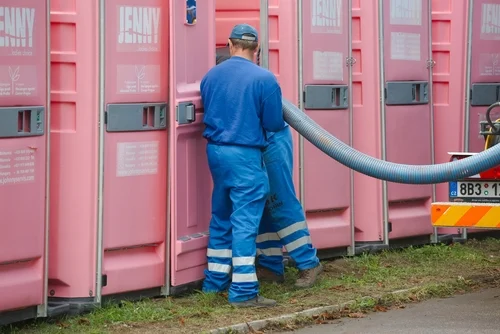How To Manage Portable Restroom Waste Spills

Managing waste spills from portable restrooms is a crucial task that event organizers and construction site managers often face. While it’s an unpleasant situation, it’s important to address it promptly and effectively to maintain a clean and safe environment for workers and attendees. In this blog post, we will discuss the risks associated with standard porta-potties tipping and why investing in portable restroom trailers is worth the extra cost, as they offer greater stability and minimize the risk of waste spills.
1. Understanding the risks of standard porta-potties tipping:
Standard porta-potties, although widely used and convenient, can pose a tipping risk due to their lightweight and compact design. Particularly in outdoor events or construction sites with uneven ground or high wind conditions, these portable restrooms can easily be tipped over, resulting in waste spills. This creates not only an unsightly and unhygienic situation but also potential health hazards and legal ramifications. Recognizing the risks of standard porta-potties tipping is the first step towards preventing waste spills.
2. The advantages of portable restroom trailers:
Portable restroom trailers offer numerous advantages over standard porta-potties, making them a worthwhile investment. Unlike traditional portable toilets, restroom trailers are fixed on wheels and have a larger and sturdier structure. These trailers are less susceptible to tipping, even in unpredictable weather conditions, due to their weight distribution and anchoring mechanisms. Their solid construction and additional stability features significantly minimize the risk of waste spills, ensuring a clean and sanitary environment for users.
3. Rapid response to waste spills:
Despite taking all possible precautions, waste spills from portable restrooms can still occur. In such situations, a rapid and coordinated response is crucial to minimize the impact and prevent further contamination. First and foremost, it is essential to establish communication channels and designate specific personnel who are trained and equipped to handle waste spills. Immediate action should be taken to cordon off the affected area, warning others about the potential hazards and the need to keep a safe distance.
4. Wearing appropriate personal protective equipment (PPE):
Before engaging in any cleanup efforts, it is imperative to wear proper personal protective equipment (PPE) to protect against potential health risks. This includes gloves, masks, aprons, and boots. It is recommended to use PPE that is resistant to chemicals and biological agents to ensure maximum protection. Additionally, access to handwashing stations and sanitizers is crucial for maintaining personal hygiene during waste spill cleanup.
5. Containment and cleanup of waste spills:
Containment and cleanup techniques will vary depending on the extent of the spill and the availability of appropriate equipment and resources. In cases of minor spills, absorbent materials, such as granular absorbents or absorbent pads, can be used to contain and absorb the waste. These materials should be properly disposed of according to local regulations. For larger spills or instances where professional help is required, contacting a hazardous waste cleanup service is recommended.
6. Reporting and documenting the incident:
After successfully managing the waste spill, it is important to document the incident and report it to the necessary authorities or the portable restroom service provider. Accurate documentation of the incident, including photographs, descriptions, and the cleanup process undertaken, will provide essential evidence in case of legal claims or insurance requirements. Proper reporting ensures transparency and allows for necessary improvements in waste management practices.
7. Preventative measures for future waste spills:
To minimize the occurrence of waste spills in the future, implementing preventive measures is essential. Investing in portable restroom trailers, as mentioned earlier, is one of the most effective strategies. Additionally, selecting appropriate locations for portable restrooms, considering the site’s topography and stability, can significantly reduce the risk of tipping. Regular inspection and maintenance of portable restrooms, including checking for leaks and repairing faulty components, should be conducted to address potential issues before they escalate.
Summary
Managing waste spills from portable restrooms requires a proactive and organized approach. Understanding the risks associated with standard porta-potties tipping and opting for portable restroom trailers can greatly reduce the likelihood of waste spills. In the event of a spill, a quick response, appropriate PPE, containment measures, and proper reporting are crucial. By implementing these best practices, event organizers and construction site managers can ensure a clean and safe environment for everyone involved.
Need Luxury Event Porta-Potties in Everett, WA?
Welcome to Royal Flush Bathrooms in Marysville, WA. We are a family-run business that provides luxury bathrooms for events. Say no to plastic industrial restrooms. No matter how clean they are, nobody wants to use them. We can change all of that! We also try to offer additional services that will make your day even more special. We can deliver a luxury bathroom, we can provide white glove service, and we can even provide stylish transportation for the guests of honor! Read more about what we do below. Contact us today to let us know how we can make your event something to be remembered!
